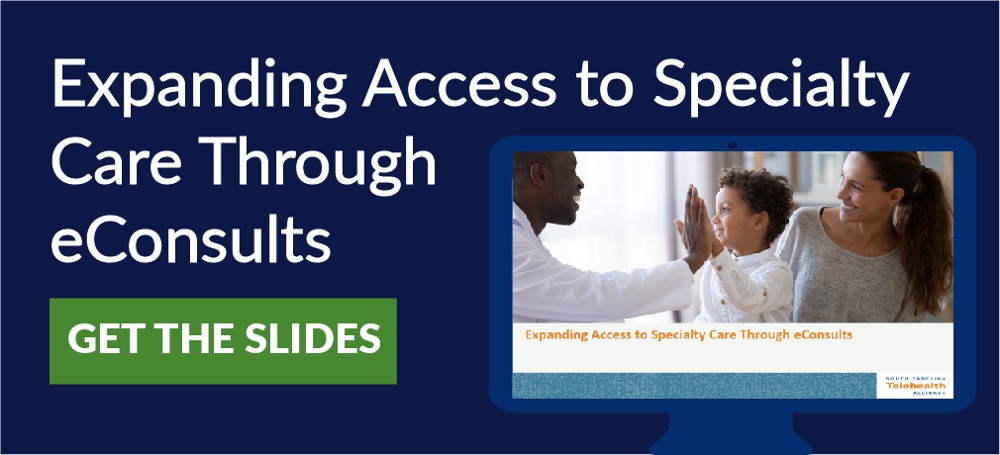How Academic Medical Centers Partner With Local Providers and Health Centers to Improve Care and Strengthen Relationships by Offering EConsults

Large academic medical centers—those hospitals affiliated with a medical school—often have the latest advancements in treatment and technology, as well as health care professionals who are at the top of their fields. But their expertise can only reach as far as patients can travel to receive care. Many in the broader community don’t benefit from the excellent care and expertise concentrated in and around the medical center.
Further complicating care delivery, specialists at academic medical centers often feel disconnected from community primary care providers (PCPs). Rural community health centers are generally small and underfunded, with limited ways to communicate and build relationships with leading specialists at academic medical centers.
EConsults—asynchronous, provider-to-provider communications that serve as a “virtual curbside consult”—can help strengthen relationships and improve care coordination between academic medical centers, community providers and health centers. EConsults allow primary care providers (PCPs) located throughout the region the ability to access patient care advice from leading specialists without the logistical barriers associated with an in-person referral.
Further, when specialists at academic medical centers and community PCPs use eConsults to collaborate on how to manage patient care, they strengthen those relationships that lead to better care coordination for patients and increased referral volume to health system specialists when referrals are necessary.
Academic Medical Center Builds Strong Relationships With Community Providers
In South Carolina, a large academic medical center found itself disconnected from the many community health centers and local primary practices located through the state. The medical center sought to build stronger connections with community practices, both to improve care coordination and patient outcomes as well as to increase referral volume when in-person referrals were necessary.
Some of the community practices were located hours away from the medical center. In addition, the community practices were typically smaller and did not have the finances to be part of a large integrated EMR, which increases the difficulty of coordinating care.
The strain of these limitations lands on the patient who is referred to the medical center’s specialists for in-person appointments. Seeing the challenges and the impact they had on patient care, the academic medical center enabled virtual appointments for patients as a solution in situations not requiring an in-person visit. In addition, they provided eConsults to the community practices to ensure in-person appointments were medically necessary.
How did the eConsults work? The medical center offered the community practices free access to an eConsult platform where community PCPs could request treatment advice for their patients instead of just referring the patient for a specialist appointment. By communicating physician to physician in the same platform about patient care, community practices relieved patients of the travel burden yet were still able to provide specialist-informed care for their patients. It’s a win-win-win.
Community providers can now receive patient care advice within hours, growing a bond between the academic medical center and community practices. The specialist at the academic medical center can not only provide treatment guidance but can also advise if the community provider can manage the patient locally, creating a better experience for both primary care provider and patient. And the platform tracks all communications between providers to improve care coordination. Once a patient is deemed appropriate for a visit to the medical center, the same platform streamlines the referral and links the PCPs EMR to that of the medical center and ensures the consult notes from the patient visit are captured back into their chart at the PCP.
The medical center and the community providers are reporting that the eConsult platform is strengthening connections between the medical center and the many community providers throughout South Carolina. And, they expect these relationships and superior treatment advice to translate to increased referral volume in the future when an in-person appointment becomes necessary. The end result is better patient care through a better coordinated care experience and being able to treat the patient’s condition earlier, with a side benefit of increased referral volume to the medical center.
Academic medical centers play an integral role in healthcare and can now benefit their communities even more by sharing their expertise through eConsults. EConsults provide a unique opportunity to bring together large academic medical centers and community physicians with a benefit to both providers and patients. Both patients and PCPs in the broader community get increased access to treatment advice from specialists who are the best in their fields at academic medical centers, without the need to travel long distances or spend time or money on an in-person appointment until it’s medically necessary.
Additionally, the previously disconnected practices create a digital connection that allows for better patient care coordination. As community PCPs consult with academic medical center specialists, this helps increase the trust and strengthen relationships between physicians. When a referral is necessary in the future, the community practice already has an established relationship with the academic medical center and has a platform to streamline the data sharing between the two providers even though they’re on disparate EMRs.
For more information on how eConsults reduce barriers and improve access to care, read our blog posts on how to overcome SDoH barriers, improve eConsult quality and solve healthcare staff shortages.
Written by Meg Wright
Meg specializes in the implementation of eConsult programs, teaching platform users and executing the programs flawlessly. As a client operations manager at ReferWell, Meg brings a decade of experience to ReferWell’s Care Navigation team that is diligently working on assisting in care gap closure programs. On top of her vast eConsult knowledge, Meg is known for the optimism she contributes to her clients and her team.

 © COPYRIGHT REFERWELL
© COPYRIGHT REFERWELL 